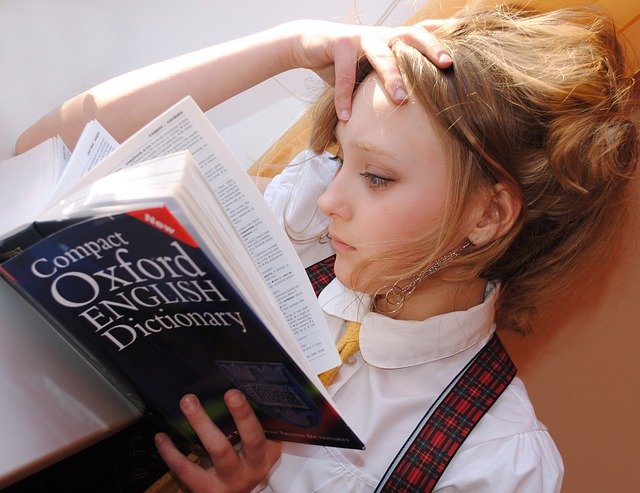When the Right Word is Wrong
Terry Odell
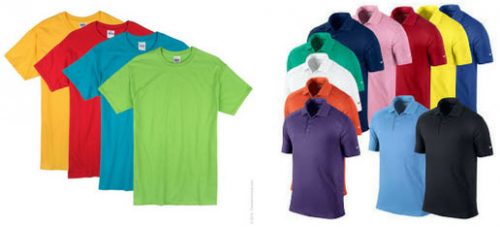 As writers, we deal in words. Thousands of words. And we’re always looking for the right word to use. But what happens when the right word is wrong?
As writers, we deal in words. Thousands of words. And we’re always looking for the right word to use. But what happens when the right word is wrong?
For example, I was reading a draft chapter from one of my writing pals. She’d written something about a man pulling up the collar of his t-shirt to wipe sweat off his face. My comment to her was, “T-shirts don’t have collars.” Her reply was “Yes, that’s what I was taught when I took sewing classes.” I recalled that when I worked a temp job, our jackets were provided, but we were told to wear shirts with collars, and the accepted attire was either a blouse with a collar or a polo shirt, but absolutely no t-shirts. Being curious, I hit the search engines and looked up t-shirts.
Merriam-Webster said this: a collarless short-sleeved or sleeveless usually cotton undershirt; also : an outer shirt of similar design
Wikipedia had this to say: a style of unisex fabric shirt, named after the T shape of the body and sleeves. It is normally associated with short sleeves, a round neckline, known as a crew neck, with no collar.
So, I was “right”—to a degree. Will readers stop reading to research words, especially ones they assume they know the meaning of? Not likely (as authors, we hate to pull anyone out of the read). However, some readers won’t notice it, because they consider the neckline of a t-shirt a collar. Others might hiccup, thinking the same way I did. Will it spoil the read? No.
Is there a solution? Maybe. When in doubt, I’d go with the dictionary definition. That way, if someone is puzzled enough to wonder, when they look it up, they’ll see the author was right.
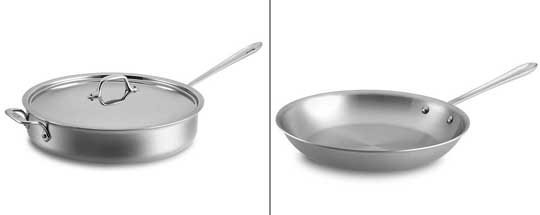 Another example. My Triple-D Ranch series includes a character who runs a cooking school. I was writing a scene where she was teaching her students about the various pots and pans they’d be using. She was talking about the differences between frying pans and sauté pans (based on my trip through the Google Machine). I ran my draft by my (former) chef brother to see if I got things right. He came back and told me all my research was “wrong” because anyone trained in cooking wouldn’t use those terms, and proceeded (at some length) to set me straight. And therein lies the rub. He’s not my “target” reader, but he knows of what he speaks. Other readers might, too. And just as many would “know” that they’re right about the differences between sauté pans and frying pans. Either way, I’m right for some, and I’m wrong for some.
Another example. My Triple-D Ranch series includes a character who runs a cooking school. I was writing a scene where she was teaching her students about the various pots and pans they’d be using. She was talking about the differences between frying pans and sauté pans (based on my trip through the Google Machine). I ran my draft by my (former) chef brother to see if I got things right. He came back and told me all my research was “wrong” because anyone trained in cooking wouldn’t use those terms, and proceeded (at some length) to set me straight. And therein lies the rub. He’s not my “target” reader, but he knows of what he speaks. Other readers might, too. And just as many would “know” that they’re right about the differences between sauté pans and frying pans. Either way, I’m right for some, and I’m wrong for some.
What did I end up writing? My instructor now says,
“Most cooking techniques and terminology we use comes from the French. However, a lot of names have been Americanized, and none of you will be ready for a fancy French restaurant simply by completing this course. You’ll be cooks, not chefs. So, I’m not going to dwell on terminology too much. As long as you can match the right tool with the right task, you’ll do fine.”
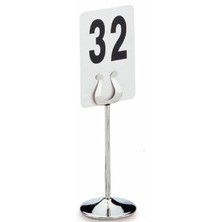 And then there’s the most important part about choosing the right word. POV.
And then there’s the most important part about choosing the right word. POV.
Example 1
My characters were in a café, and it was one where customers place their orders at the counter, and the clerk hands them a metal stand with their order number on it to display on their table so the servers can find them.
First, I’d shown the heroine entering the café and placing her order.
She paid for her meal, accepted the metal holder with the number eighteen from the clerk, and found a small table in the back of the crowded café, inhaling the blend of aromas as she waited for her order to be ready.
In the next scene, the hero arrives and places his order.
At the counter, Bailey ordered a burger—a man had to eat, right?—and carried his stand with its number to Tyrone’s table.
My critique partner had trouble with the word “stand” in the second example, and asked what they were really called, and maybe I should use that definition instead.
So, I took a quick trip through Google and learned they’re called “Table Number Stands,” so my use of the term is correct.
Example 2
My character was at an event in a hotel, and she was going to leave, so she wanted to get rid of the half-empty glass she was carrying.
I’ve been to enough events at hotels or banquet halls, and I know the catering people normally have trays on stands set up at various places around the room where guests can deposit their used dishes. But I didn’t know what they were called.
But you know what? I forgot one crucial aspect. Would the character know?
What if my research showed the aforementioned table number stands were called Grabbendernummers. Then, I could have written, “Bailey carried his Grabbendernummer to the table.” But would he know that?
You see, it doesn’t really matter what you, the author knows or doesn’t know about something. It’s what the character knows. If my character with the half-empty glass were in the catering business, then yes, she’d refer to that tray by a proper name, if it had one. (And per my brother the chef and all the Googling I’d done, there isn’t a specific term for them.) So, my heroine, would simply see the tray on a stand. It might be black, or brown, or covered with linens, but she’s going to think of it as a tray.
Yes, do your research. But if you want to save a lot of time—especially if you’re easily sidetracked while looking something up—ask yourself if the character would know whatever you’re researching first. Just because the author knows (or looked up) what a particular object is called, in Deep POV, it’s the character who has to know it. The character is going to use whatever vocabulary exists in his head, not the author’s.
Are you a stickler for the correct word? Do your characters know them?
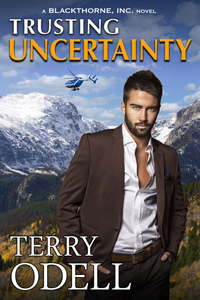 Now available for Preorder. Trusting Uncertainty, Book 10 in the Blackthorne, Inc. series.
Now available for Preorder. Trusting Uncertainty, Book 10 in the Blackthorne, Inc. series.
You can’t go back and fix the past. Moving on means moving forward.
Terry Odell is an award-winning author of Mystery and Romantic Suspense, although she prefers to think of them all as “Mysteries with Relationships.” Follow her on Facebook and Twitter.

